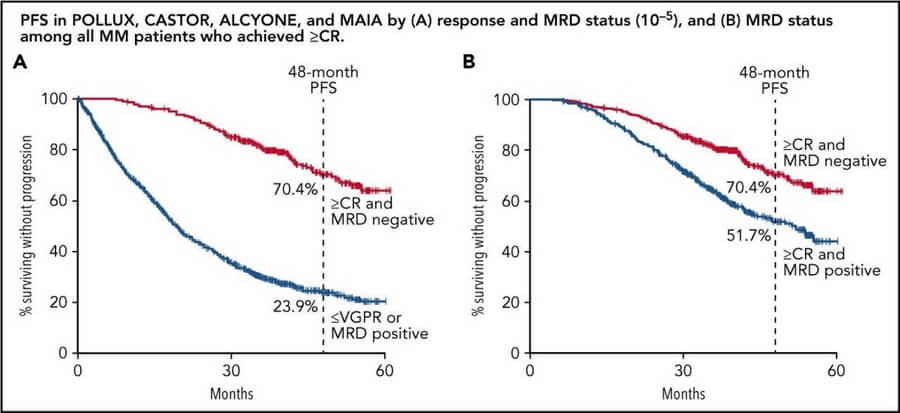Author(s): Michele Cavo 1, Jesus San-Miguel 2, Saad Z Usmani 3, Katja Weisel 4, Meletios A Dimopoulos 5, Hervé Avet-Loiseau 6, Bruno Paiva 2, Nizar J Bahlis 7, Torben Plesner 8, Vania Hungria 9, Philippe Moreau 10, Maria-Victoria Mateos 11, Aurore Perrot 12, Shinsuke Iida 13, Thierry Facon 14, Shaji Kumar 15, Niels W C J van de Donk 16, Pieter Sonneveld 17, Andrew Spencer 18, Maria Krevvata 19, Christoph Heuck 19, Jianping Wang 20, Jon Ukropec 21, Rachel Kobos 19, Steven Sun 20, Mia Qi 20, Nikhil Munshi 22 23
Author Affiliations
1IRCCS Azienda Ospedaliero-Universitaria di Bologna, Istituto di Ematologia “Seràgnoli”, Dipartimento di Medicina Specialistica, Diagnostica e Sperimentale, Università di Bologna, Bologna, Italy.
2Clínica Universidad de Navarra, Centro de Investigación Medica Aplicada (CIMA), IDISNA, CIBER-ONC, Pamplona, Spain.
3Levine Cancer Institute/Atrium Health, Charlotte, NC.
4Department of Oncology, Hematology and Bone Marrow Transplantation with Section of Pneumology, University Medical Center Hamburg-Eppendorf, Hamburg, Germany.
5National and Kapodistrian University of Athens, Athens, Greece.
6Unite de Genomique du Myelome, IUC-Oncopole, Toulouse, France.
7Arnie Charbonneau Cancer Research Institute, University of Calgary, Calgary, AB, Canada.
8Vejle Hospital and University of Southern Denmark, Vejle, Denmark.
9Clinica Medica São Germano, São Paulo, Brazil.
10Hematology, University Hospital Hôtel-Dieu, CHU Nantes, Nantes, France.
11University Hospital of Salamanca/IBSAL/Cancer Research Center-IBMCC (USAL-CSIC), Salamanca, Spain.
12Hematology Department, University Cancer Institute IUCT, Toulouse, France.
13Department of Hematology and Oncology, Nagoya City University Graduate School of Medical Sciences, Mizuho-ku Nagoya, Japan.
14University of Lille, CHU Lille, Service des Maladies du Sang, Lille, France.
15Department of Hematology, Mayo Clinic Rochester, Rochester, MN.
16Department of Hematology, Amsterdam University Medical Center, Vrije Universiteit Amsterdam, Amsterdam, The Netherlands.
17Erasmus MC, Rotterdam, The Netherlands.
18Malignant Haematology and Stem Cell Transplantation Service, Alfred Health-Monash University, Melbourne, Australia.
19Janssen Research & Development, LLC, Spring House, PA.
20Janssen Research & Development, LLC, Raritan, NJ.
21Janssen Global Medical Affairs, Horsham, PA.
22Dana-Farber Cancer Institute, Harvard Medical School, Boston, MA; and.
23Veterans Administration Boston Healthcare System, West Roxbury, MA.

